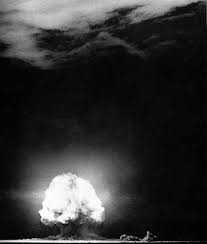 T.H.E.M.
¨We believe in the judgment; we believe this first judgment will take place as God revealed, in America...¨
T.H.E.M.
¨We believe in the judgment; we believe this first judgment will take place as God revealed, in America...¨
 T.H.E.M.
¨We believe in justice for all, whether in God or not; we believe as others, that we are due equal justice as human beings.¨
T.H.E.M.
¨We believe in justice for all, whether in God or not; we believe as others, that we are due equal justice as human beings.¨
"AMERICA" TOPS THE LIST YET AGAIN OF WORLD'S MERCHANT OF DEATH
Exclusive: U.S. heads for record overseas arms sales in 2009
“WASHINGTON (Reuters) – The United States is close to a new peak in government-to-government arms sales, poised to top last year’s record $36.4 billion, Pentagon figures showed.
With one month left in fiscal 2009, the value of such deals stood at $35.3 billion, not including any that may be wrapped up by the September 30 close of the fiscal year, the Pentagon’s Defense Security Cooperation Agency said Thursday.
“Anything could tip the scale on this,” said Charles Taylor, an agency spokesman.
U.S. arms sales have boomed in the past two years, in part because of regional tensions surrounding nuclear and ballistic missile programs in Iran and North Korea.
As recently as fiscal 2007, the value of government-to-government U.S. foreign military sales totaled $23.3 billion.
The Pentagon’s biggest suppliers, including Lockheed Martin Corp, Boeing Co and Northrop Grumman Corp, are looking more and more to overseas markets to offset Pentagon budget belt-tightening.
Andrew Shapiro, an assistant secretary of state responsible for political-military affairs, said Wednesday the State Department had licensed more than $100 billion in direct commercial sales of “defense articles and services” last year, in addition to the government-brokered sales.
“This year we expect to see a comparable volume of commercial sales, he told a defense-industry conference known as COMDEF 2009. He said it was not yet clear whether global economic woes would have a statistically significant impact on government-to-government arms sales.
In 2008, the United States accounted for a lopsided 70.1 percent of all arms transfer agreements with developing nations, or $29.6 billion, according to a September 4 report by the nonpartisan U.S. Congressional Research Service.
Way back in second place was Russia with $3.3 billion or 7.8 percent of such agreements. France was third with $2.5 billion or 5.9 percent, the report said.
Shapiro, in his first public speech since taking over in June as an Obama administration point person on arms-sales policy, described weapons deals as “an important avenue by which we can leverage American industry’s powerful appeal and innovative capacity to further America’s vital security interests and those of our international partners.”
Arms sales represent “yet another important tool for broadening and deepening our partnerships with emerging powers such as India, as well as strengthening long-time security ties with steadfast friends and allies,” he said.
The Obama administration was reviewing Taiwan’s and Iraq’s stated hopes to acquire Lockheed Martin-built F-16 multirole fighter aircraft, Shapiro said in reply to a question.
“I don’t want to get out front of any announcement on those,” he said, “but you can be assured that we are considering and reviewing those sensitive, high-profile sales.”
“We also expect that the strong defense trade relationship with Saudi Arabia and the Gulf Cooperation Council countries will continue,” Shapiro said.
Such partnerships are essential to address shared security concerns and to Secretary of State Hillary Clinton’s vision of a “smart power” foreign policy, he said.
The concept of “smart power” — weaving together defense, development and other tools of “hard” and “soft” power — is at the heart of President Barack Obama’s foreign policy vision, he added.
Shapiro said the administration would not rule out the possible overseas sale of unmanned aerial vehicles despite a presumption against such sales under a voluntary international pact known as the Missile Technology Control Regime.
The MTCR guidelines curb transfers of “missiles” — defined as rocket systems, including ballistic missiles and unmanned aerial vehicles capable of delivering weapons of mass destruction, plus their related equipment and technology.
The pact emphasizes curbs on exports of unmanned systems capable of delivering a payload of at least 500 kg a distance of at least 300 km, so called “Category I” or “MTCR-class” systems.
“There is a presumption against selling MTCR Category 1,” Shapiro told a questioner. “But there are cases where that presumption can be overcome. We take a look at each case on a case by case basis.”
(Reporting by Jim Wolf; Editing by Richard Chang)”
Click here for reuse options!Copyright 2010 Hiram's 1555 Blog





